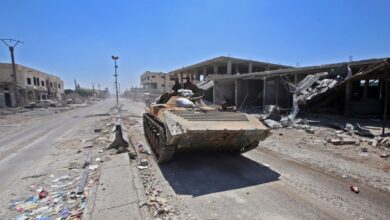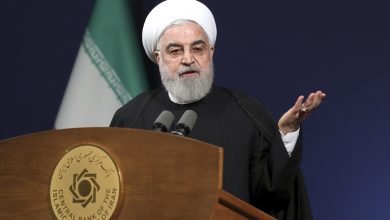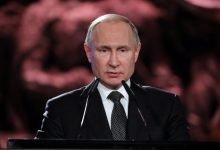
This week’s bulletin from the Saudi government congratulated the new Japanese emperor, condemned a truck bombing in Afghanistan and noted discussions with Brazil over intellectual property rights.
Conspicuous by its absence was a country where Saudi Arabia has wielded influence for decades and where protests against the political establishment have turned into the stirrings of another Middle East revolution.
The official silence in the Arab world over the unrest that’s rocked Lebanon for more than a week could have come from Napoleon’s playbook of not interfering when your enemy is in the process of destroying itself. Demonstrators in Beirut and other Lebanese regions have united against a regime dominated by Hezbollah, a proxy of Iran that Saudi Arabia and other Gulf countries label as terrorist and have long tried to undermine.
One Gulf official, who declined to be identified by name when talking about sensitive foreign policy, said tight lips are deliberate even as Saudi and other Gulf commentators and television channels salute the protesters. What’s more, Lebanese Prime Minister Saad Hariri is being refused financial help to avoid money going to Hezbollah via the government, according to the official and two more people familiar with the matter.
Anger over economic hardship and allegations of corruption have been a hallmark of Lebanon for years. This time, though, politicians of all religions and stripes have been engulfed, including Hezbollah and its leader, Hassan Nasrallah, who was considered an untouchable icon.
Chants of “all of them means all of them” calling for a blanket dismissal of the country’s power brokers have risen from Sunni Muslim hotbeds Tripoli and Akkar in the north, Hezbollah-controlled cities of Baalbek in the east and Nabatiyyeh in the south and mainly Christian areas in central Beirut.
“What’s happening is a gift from heaven for Saudi Arabia and other countries in their proxy war with Iran,” said Sami Nader, head of the Levant Institute in Beirut. Keeping out of it, though, is key, he said. “It’s obvious that Hezbollah is the first loser here so any sign there’s a regional power trying to hijack the movement will polarize the protest and divide it along sectarian lines.”
Like Saudi Arabia, Kuwait and the United Arab Emirates have also refrained from issuing official statements or the usual pleas for calm, limiting their actions to evacuating their citizens from Lebanon.
The three monarchies have until recently been key in providing bailouts and financial help when Lebanon’s economy teetered on the brink of collapse. Lebanon is one of the most indebted countries in the world, and its attempts before the protests began to get fresh sources of funding have floundered.
Prime Minister Hariri visited Abu Dhabi a few weeks ago and got no support, the Gulf official said. By contrast, when unrest broke out in Sudan and its leader was toppled, the U.A.E. and Saudi Arabia pledged $3 billion to head off any chaos.
The Gulf allies largely stood on the sidelines over Lebanon for two key reasons, the people familiar with their strategy said. Hariri has not carried out any of the reforms demanded by donors to begin releasing money pledged at a conference in 2018 and Hezbollah’s entrenched influence, they said.
“In a way, you bail out Lebanon, you bail out Hezbollah,” said Shafeeq Ghabra, a political science professor at Kuwait University.
The militant group is Iran’s biggest success at exporting the 1979 Islamic Revolution. It has mobilized thousands of men to fight Israel and, more recently, mainly Sunni rebels in Syria.
At home in Lebanon, it’s more powerful than the U.S.-equipped army. The organization also has a network of charities providing social aid and affordable health care that its Shiite supporters benefit from. It won its first legislative seat in Sunni-dominated Beirut in 2018 as Hariri, the pro-Saudi Sunni premier, failed to curb its influence. He was brought to Riyadh to face Crown Prince Mohammed bin Salman later that year.
Nasrallah urged protesters on Oct. 19 to express their opinions politely, adding with a smile, “Curse me, there’s no problem.” In a veiled threat to Hariri and his allies, Nasrallah said those who try to flee their responsibilities after years in power should be put on trial.
The group, though, has been under financial strain as U.S. sanctions on Iran tightened. Breaking a taboo, members of Hezbollah’s Shiite base accused Nasrallah and his lawmakers in Parliament of covering up endemic corruption, wasting resources on fighting in Syria and ignoring people’s welfare and needs.
While Gulf governments have refused to comment publicly, the dissent wasn’t lost on commentators.
“The wall of fear has broken: the Lebanese street opens fire on Nasrallah,” declared a front-page headline this week in Okaz, a Saudi newspaper close to the government. “The Hezbollah movement saw rare demonstrations criticizing the party and leader Nasrallah,” said another in Saudi Gazette.
Gulf citizens also have been effusive in their praise for a campaign that has brought both light-hearted and iconic moments: a woman kicking an armed guard in the groin, a DJ entertaining crowds in a conservative city, hairdressers giving free cuts and demonstrators hugging tearful soldiers overcome with emotion.
“In all revolutions, protesters are grim while their governments make fun of them, except for the protests in Lebanon,” Kuwaiti talk-show host Jaafar Mohammed said on AlShahed television.
Lebanon was ripped apart by a 15-year civil war that ended in 1990 with a fragile peace. Sectarian tension between communities of Sunni and Shiite Muslims and Christians has never been far away.
Hariri came up with a new financial package for the country that includes slashing the salaries of current and former ministers and parliamentarians by half. President Michel Aoun on Thursday said changes to the political system, though, should come through institutions and not protest.
On the official level, Gulf countries have not abandoned Lebanon, said one of the people familiar with their thinking. They will help any government that can be a credible partner, is serious about reform and has the guts to curb Hezbollah’s influence in the country, the person said. In 2016, Saudi Arabia scrapped $3 billion in military aid and $1 billion for the police, blaming Hezbollah’s prominent role.
“They want to see where things are heading and they don’t want to preempt any development,” said Emirati political science professor Abdulkhaleq Abdulla. “It’s not the time to take any official position except just to be there, watch and monitor things very closely until things become clear.”
Source: Bloomberg







